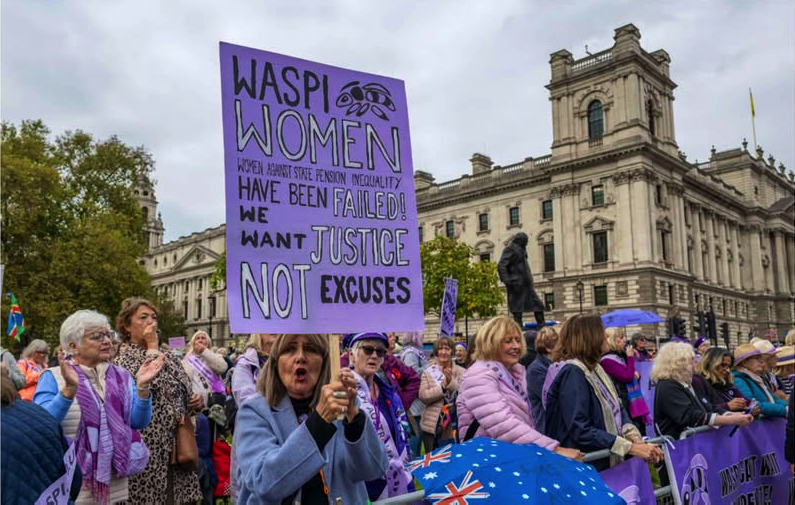If you’ve been following the buzz around WASPI Women compensation, you’ve probably heard that things are heating up. Yup, you read that right — women born in the 1950s, who were hit hard by sudden changes to the UK state pension age, are edging closer to possible £2,950 payouts. After years of campaigning, legal wrangling, and government back-and-forth, a major milestone has been reached with the Department for Work and Pensions (DWP). And this latest turn could finally put real money in the pockets of those who feel short-changed.

So let’s break it down in plain English. What’s going on? Who’s impacted? And what does this mean if you or someone you know falls into this group? Grab a coffee — this is gonna be a ride.
WASPI Women Edge Closer to £2950 Compensation
| Point | Details |
|---|---|
| Who’s involved | Women born in the 1950s, around 3.6–3.8 million affected |
| What happened | State pension age changes weren’t properly communicated |
| Compensation | Parliamentary Ombudsman recommended £1,000–£2,950 each |
| Latest milestone | High Court granted cost-capping, allowing judicial review to proceed |
| Government stance | Labour govt (Dec 2024) rejected payouts, citing cost (~£10.5bn) |
| Potential payout | Up to £2,950 per eligible woman, pending court ruling |
| Official WASPI site | waspi.co.uk |
The WASPI women’s fight for £2,950 compensation has reached a turning point. With the High Court granting cost-capping, the path is clear for their judicial review to move forward. While nothing is guaranteed, the determination of millions of women, combined with mounting legal pressure, means the issue isn’t going away. Whether you’re in the UK or the U.S., the lesson here is crystal clear: when communication fails, trust is broken — and accountability must follow.
What’s the WASPI Campaign All About?
Back in the day, many women born in the 1950s expected to retire at 60. That’s what they’d planned their lives around. But the government gradually shifted the state pension age to bring it in line with men’s — aiming for equality but failing to properly inform the women affected. That left millions scrambling to adjust, some finding out way too late that they’d have to work years longer.

The group known as Women Against State Pension Inequality (WASPI) formed to fight back. Their argument? The Department for Work and Pensions (DWP) botched the communication, creating real hardship. Many had already left work, downsized, or made financial decisions assuming they’d retire at 60 — only to discover the rules of the game had changed.
Why the £2950 Number Matters
Here’s the deal. The Parliamentary and Health Service Ombudsman (PHSO) — an independent watchdog — found that the DWP committed maladministration. In plain talk, they messed up big time. The PHSO recommended compensation between £1000 and £2950 per woman, depending on individual impact.
Now, if you’re doing the math, multiply that by the roughly 3.8 million women affected and you’re looking at a whopping £10 billion-plus bill for the government. That’s why the stakes are sky-high.
The Government’s Position — and Why It’s Shaky
Fast forward to December 2024. The Labour government, newly in power, straight-up rejected the Ombudsman’s payout recommendation. The Work and Pensions Secretary argued that most women should have known the changes were coming, so coughing up billions in taxpayer money wasn’t “proportionate.”
But here’s the kicker: while the government slammed the brakes, WASPI campaigners revved the engine. They filed a judicial review, basically a legal challenge, to force the government to reconsider.
And in a big win, the High Court has now granted cost-capping — limiting the risk that campaigners could be buried under legal bills if they lose. Translation: they can fight on without risking financial ruin.
What This Means for WASPI Women
So, what’s next? Here’s the roadmap:
- Judicial review proceeds — WASPI’s legal challenge continues in the High Court.
- If successful — compensation between £1,000–£2,950 could roll out to eligible women.
- If rejected again — the fight could drag on, but momentum is clearly with the campaigners.
Think of this like a football game going into overtime. The government thought they’d called it, but WASPI pulled a comeback move. And now the score is wide open.
The Human Impact — Real-Life Stories
Behind every statistic is a story. Take Linda, a 63-year-old from Manchester, who left her job at 59 thinking she’d soon receive her pension. Instead, she discovered she’d have to wait nearly six more years. “I had to dip into my savings, and now I’m worried about paying bills in retirement,” she told campaigners. Stories like hers put a face to the struggle, making it clear this fight isn’t just about numbers — it’s about dignity and survival.
Similarly, women in rural areas who already faced limited job opportunities felt the pinch harder. For some, the unexpected delay meant taking part-time jobs in retail or caregiving just to stay afloat. These stories underscore why campaigners are pushing so fiercely for compensation.
Practical Advice If You’re Affected
If you or your mom, aunt, or neighbor is a WASPI woman, here’s what you can do right now:
- Stay informed: Bookmark the official WASPI campaign site and check for updates.
- Keep records: Hang onto paperwork about your pension, work history, and any notices you received (or didn’t receive).
- Join the movement: WASPI often runs fundraising drives to cover legal costs. Even small donations add up.
- Talk to financial advisors: If compensation comes through, you’ll want a plan for using it wisely — think debt payoff, boosting retirement savings, or securing healthcare coverage.
- Connect with support groups: Communities online and locally often share resources and coping strategies. Sometimes just talking to others in the same boat helps ease the burden.
The Numbers Behind the Story
- 3.8 million: Estimated number of women born in the 1950s impacted.
- £10.5 billion: Estimated total compensation bill if max payout is granted.
- £2,950: Maximum individual compensation suggested by the Ombudsman.
- £60,000: WASPI’s capped liability if they lose the case, thanks to High Court ruling.
- £90,000: Potential costs the DWP may have to cover if WASPI wins.
These aren’t just numbers on a page — they represent real women’s futures.
1995 Pensions Act vs. 2011 Pensions Act
| Feature | 1995 Pensions Act | 2011 Pensions Act (Accelerated) |
| Objective | Equalise State Pension Age for men and women at 65. | Accelerate the timetable for equalisation due to increasing life expectancy. |
| Original Timeline | Phased increase for women from 60 to 65 between 2010 and 2020. | Brought forward the increase to reach 65 by November 2018. |
| Impact | Affected women born from 1950 to 1955. | Further increased pension age for women born between 1953 and 1955. |
| WASPI’s Argument | Women were not given adequate notice of the changes. | The acceleration compounded the problem, leaving women with even less time to plan. |
International Lessons: What the U.S. and Others Can Learn
Now, you might be wondering: “Okay, but why should someone in the U.S. care?” Good question. This is a textbook case of how policy changes without proper communication can wreck everyday lives. It’s a reminder that retirement planning isn’t just about personal savings — it’s also about trusting that governments will hold up their end of the bargain.
For American readers, think Social Security. Imagine if Uncle Sam suddenly raised the retirement age overnight without telling you. Same frustration, same financial chaos. For other countries, this case is a warning: reforms must come with transparency, outreach, and fairness. Otherwise, trust collapses.
Historical Context of Pension Battles
This isn’t the first time pensioners have had to fight for justice. Back in the U.S., debates over Social Security reforms in the 1980s caused major uproar. In the UK, miners, teachers, and healthcare workers have also clashed with governments over pension rights. The WASPI campaign fits into a long tradition of working people pushing back when institutions fail to deliver.
FAQs
Q: Who qualifies as a WASPI woman?
A: Women born in the 1950s, especially those who expected to retire at 60 but faced sudden state pension age changes.
Q: When will compensation be paid out?
A: Not yet. Payments depend on the outcome of the judicial review. The case is ongoing in 2025.
Q: How much could I get?
A: The Ombudsman recommended between £1,000 and £2,950. Final amounts will depend on legal rulings and government action.
Q: Is this guaranteed?
A: Nope. While momentum is strong, the government has resisted payouts. The court’s decision will be crucial.












